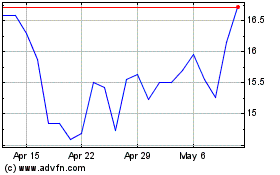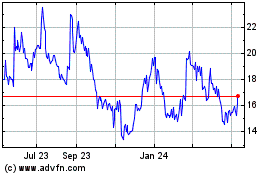- Domvanalimab plus zimberelimab was associated with greater
progression-free survival, overall survival, and objective response
rate compared with those of zimberelimab or chemotherapy
- A 36% reduction in risk of death (HR=0.64) was observed for
domvanalimab plus zimberelimab compared to zimberelimab alone;
zimberelimab reached a median overall survival of two years while
the median overall survival for domvanalimab plus zimberelimab was
not reached
- Treatment-related adverse events leading to treatment
discontinuation were low (10.5%) for the combination of
domvanalimab and zimberelimab relative to chemotherapy (23.5%)
- Arcus will discuss these results on its earnings call at 2:00
PM PT / 5:00 PM ET Wednesday, November 6, 2024
Arcus Biosciences, Inc. (NYSE:RCUS), a clinical-stage, global
biopharmaceutical company focused on developing differentiated
molecules and combination therapies for patients with cancer, today
announced results from Part 1 of ARC-10, a randomized, open-label,
three-arm study evaluating domvanalimab, an Fc-silent anti-TIGIT
monoclonal antibody, plus zimberelimab, an anti-PD-1 monoclonal
antibody, (DZ) versus zimberelimab (Z) or chemotherapy in patients
with front-line locally advanced or metastatic squamous or
non-squamous non-small cell lung cancer (NSCLC) with PD-L1 tumor
proportion score (TPS) ≥50% without the presence of any tumor
genomic aberration or driver mutation for which a targeted therapy
is approved. This study was conducted in partnership with Gilead
Sciences. These results will be presented on November 8 in a
late-breaking poster session at the Society for Immunotherapy of
Cancer (SITC) 2024 Annual Meeting by Melissa L. Johnson, M.D.,
Director of the Lung Cancer Research Program, Sarah Cannon Research
Institute, and investigator for the ARC-10 study.
“Domvanalimab plus zimberelimab demonstrated a meaningful
improvement in overall survival compared to zimberelimab alone,
with a 36% reduction in risk of death and a median overall survival
that will exceed two years,” said Melissa L. Johnson, M.D. “These
data provide further evidence that co-inhibiting the TIGIT and PD-1
pathways may result in a greater therapeutic benefit over
inhibition of the PD-1 pathway alone.”
“These are the first results demonstrating an improvement in
overall survival reported for domvanalimab and zimberelimab,” said
Dimitry Nuyten, M.D., Ph.D., chief medical officer of Arcus. “They
add to the growing body of evidence that domvanalimab, an Fc-silent
anti-TIGIT antibody, may have a differentiated efficacy, safety and
tolerability profile relative to published data from studies with
Fc-enabled anti-TIGIT antibodies.”
At the time of data cutoff (DCO, May 17, 2024), 98 patients were
randomized and 95 received treatment in Part 1 of the study. The
median follow-up was 24.5 months, and as of the DCO, 22 patients
remained on treatment (DZ, n=11; Z, n=10; chemo, n=1). Patient
baseline demographics were generally balanced across the arms, with
a slight imbalance of more patients with adenocarcinoma, ECOG
status 0, and brain metastasis favoring the chemotherapy arm. A
summary of efficacy results is below.
Endpoint
DZ
(n=38)
Z
(n=40)
Platinum-Doublet
Chemo*
(n=17)
Overall Survival (OS)
Median, months (95% CI)
NR (13.7-NE)
24.4 (7.8-NE)
11.9 (2.7-NE)
Hazard Ratio (95% CI)
DZ vs Z
0.64 (0.32-1.25)
DZ vs chemo
0.43 (0.20, 0.93)
Z vs chemo
0.63 (0.30-1.29)
12-Month Survival Rate (95% CI)
68%
57%
50%
Events, % (n)
36.8 (14)
52.5 (21)
70.6 (12)
Progression-Free Survival
(PFS)**
Median, months (95% CI)
11.5 (4.0-26.2)
6.2 (2.5-12.3)
9.6 (2.6-16.4)
Hazard Ratio (95% CI)
DZ vs Z
0.69 (0.40-1.18)
DZ vs chemo
0.69 (0.35, 1.38)
Z vs chemo
1.07 (0.56-2.05)
Events, % (n)
36.8 (14)
75.0 (30)
76.5 (13)
Confirmed Objective Response
Rate**
% (n)
[95% CI]
44.7 (17)
[28.6-61.7]
35.0 (14)
[20.6-51.7]
35.3 (6)
[14.2-61.7]
CI: confidence interval; NE: not
evaluable; NR: not reached.
*Carboplatin with either paclitaxel or
pemetrexed.
**Assessed per investigator according to
RECIST v1.1.
DZ and Z were generally well tolerated with no new safety
concerns at the time of DCO. Treatment-related adverse events
(TRAEs) leading to treatment discontinuation were higher for
chemotherapy (23.5%) than for DZ (10.5%) and Z (7.5%).
Infusion-related reactions were low (DZ, 7.9%; Z, 2.5%;
chemotherapy, 0%). Grade ≥3 TRAEs were higher for chemotherapy
(47.1%) than for DZ (21.1%) or Z (15.0%). TRAEs leading to death
were lower for DZ (2.6%; n=1 sudden death) vs Z (10.0%; n=1 each
sudden death, acute kidney injury, acute myocardial infarction,
intestinal perforation) or chemotherapy (11.8%; n=1 each febrile
neutropenia, ischemic stroke).
Investors may dial into the earnings conference call at +1 (404)
975-4839 (local) or +1 (833) 470-1428 (toll-free), using Access
Code: 940081, on Wednesday, Nov. 6, 2024, at 2:00 PM PT / 5:00 PM
ET. Participants may also register for the call online using this
link:
https://www.netroadshow.com/events/login?show=4818aee3&confId=72838.
To access the live webcast and accompanying slide presentation,
please visit the “Investors & Media” section of the Arcus
Biosciences website at www.arcusbio.com. A replay will be available
following the live event.
About the ARC-10 Study
ARC-10 was initially initiated and conducted as a randomized
Phase 3 trial; the protocol was subsequently amended to evaluate
domvanalimab plus zimberelimab versus pembrolizumab (part 2). Part
1 of the ARC-10 study is a multicenter, randomized, open-label
study for patients with front-line locally advanced or metastatic
squamous or non-squamous NSCLC with PD-L1 TPS ≥50% without the
presence of any tumor genomic aberration or driver mutation for
which a targeted therapy is approved. The study randomized patients
2:2:1 across the three study arms to receive every three weeks: (1)
15 mg/kg of domvanalimab plus 360 mg/kg of zimberelimab, (2) 360
mg/kg of zimberelimab or (3) platinum doublet chemotherapy in
countries where anti-PD-(L)1 monotherapy was not yet standard of
care. The primary endpoint was PFS per Response Evaluation Criteria
in Solid Tumors (RECIST 1.1). The secondary endpoints were OS,
confirmed ORR and safety.
About Domvanalimab
Domvanalimab is the most clinically advanced Fc-silent
investigational monoclonal antibody that was specifically designed
with Fc-silent properties to block and bind to the T-cell
immunoreceptor with Ig and ITIM domains (TIGIT), a checkpoint
receptor on immune cells that acts as a brake on the anticancer
immune response. By binding to TIGIT with Fc-silent properties,
domvanalimab is believed to work by freeing up immune-activating
pathways and activating immune cells to attack and kill cancer
cells without depleting the peripheral regulatory T cells important
in avoiding immune-related toxicity.
Combined inhibition of both TIGIT and programmed cell death
protein-1 (PD-1) is believed to significantly enhance immune cell
activation, as these checkpoint receptors play distinct,
complementary roles in anti-tumor activity. Domvanalimab is being
evaluated in combination with anti-PD-1 monoclonal antibodies,
including zimberelimab, as well as other investigational cancer
immunotherapies and A2a/A2b adenosine receptor antagonist
etrumadenant, in multiple ongoing and planned early and late-stage
clinical studies in various tumor types.
About Zimberelimab
Zimberelimab is an anti-programmed cell death protein-1 (PD-1)
monoclonal antibody that binds PD-1, with the goal of restoring the
anti-tumor activity of T cells. Zimberelimab has demonstrated high
affinity, selectivity and potency in various tumor types.
Zimberelimab is being evaluated in the U.S. and globally as a
foundational anti-PD-1 treatment option in multiple ongoing and
planned early and late-stage clinical studies in combination with
other immunotherapies, including investigational Fc-silent
anti-TIGIT monoclonal antibody domvanalimab and A2a/A2b adenosine
receptor antagonist etrumadenant.
Guangzhou Gloria Biosciences Co. Ltd., which holds
commercialization rights for zimberelimab in greater China, has
obtained approval for zimberelimab for the treatment of recurrent
or metastatic cervical cancer and for relapsed or refractory
classical Hodgkin's lymphoma. Zimberelimab is not approved for any
use in the U.S. or other regions outside of China. Gloria conducts
its development and commercialization activities independent of
Arcus and Gilead.
Domvanalimab and zimberelimab are investigational molecules.
Arcus and Gilead have not received approval from any regulatory
authority for any commercial use globally, and their safety and
efficacy for the treatment of lung cancer have not been
established.
About Arcus Biosciences
Arcus Biosciences is a clinical-stage, global biopharmaceutical
company developing differentiated molecules and combination
medicines for people with cancer. In partnership with industry
collaborators, patients and physicians around the world, Arcus is
expediting the development of first- or best-in-class medicines
against well-characterized biological targets and pathways and
studying novel, biology-driven combinations that have the potential
to help people with cancer live longer. Founded in 2015, the
company has expedited the development of multiple investigational
medicines into clinical studies, including new combination
approaches that target TIGIT, PD-1, HIF-2a, CD73, dual A2a/A2b
receptor, CD39, and AXL. For more information about Arcus
Biosciences’ clinical and preclinical programs, please visit
www.arcusbio.com.
Forward-Looking Statements
This press release contains forward-looking statements. All
statements regarding events or results to occur in the future
contained herein are forward-looking statements reflecting the
current beliefs and expectations of management made pursuant to the
safe harbor provisions of the Private Securities Litigation Reform
Act of 1995, including, but not limited to, the statements in Dr.
Nuyten’s and Dr. Johnson’s quotes and statements regarding the
efficacy, safety or potential of domvanalimab and/or zimberelimab;
the mechanisms of action for any of our investigational products;
and current or future combinations involving our investigational
products, including the potential benefit or effect of any such
combinations. All forward-looking statements involve known and
unknown risks and uncertainties and other important factors that
may cause Arcus’s actual results, performance or achievements to
differ significantly from those expressed or implied by the
forward-looking statements. Factors that could cause or contribute
to such differences include, but are not limited to, risks
associated with: interim data not being replicated in other ongoing
or future studies evaluating the same investigational molecules or
regimen; the unexpected emergence of adverse events or other
undesirable side effects in Arcus’s investigational products,
including domvanalimab and zimberelimab; Arcus’s dependence on the
collaboration with Gilead for the successful development and
commercialization of its optioned molecules, including domvanalimab
and zimberelimab; difficulties associated with the management of
the collaboration activities with our strategic partners or
expanded clinical programs; changes in the competitive landscape
for Arcus’s programs; and the inherent uncertainty associated with
pharmaceutical product development and clinical trials. Risks and
uncertainties facing Arcus are described more fully in the “Risk
Factors” section of Arcus’s most recent periodic report filed with
the U.S. Securities and Exchange Commission. You are cautioned not
to place undue reliance on the forward-looking statements, which
speak only as of the date of this press release. Arcus disclaims
any obligation or undertaking to update, supplement or revise any
forward-looking statements contained in this press release except
to the extent required by law.
The Arcus name and logo are trademarks of Arcus Biosciences,
Inc. All other trademarks belong to their respective owners.
View source
version on businesswire.com: https://www.businesswire.com/news/home/20241105383975/en/
Investor Inquiries: Pia Eaves VP of Investor Relations
& Strategy (617) 459-2006 peaves@arcusbio.com
Media Inquiries: Holli Kolkey VP of Corporate Affairs
(650) 922-1269 hkolkey@arcusbio.com
Arcus Biosciences (NYSE:RCUS)
Historical Stock Chart
From Dec 2024 to Jan 2025

Arcus Biosciences (NYSE:RCUS)
Historical Stock Chart
From Jan 2024 to Jan 2025
